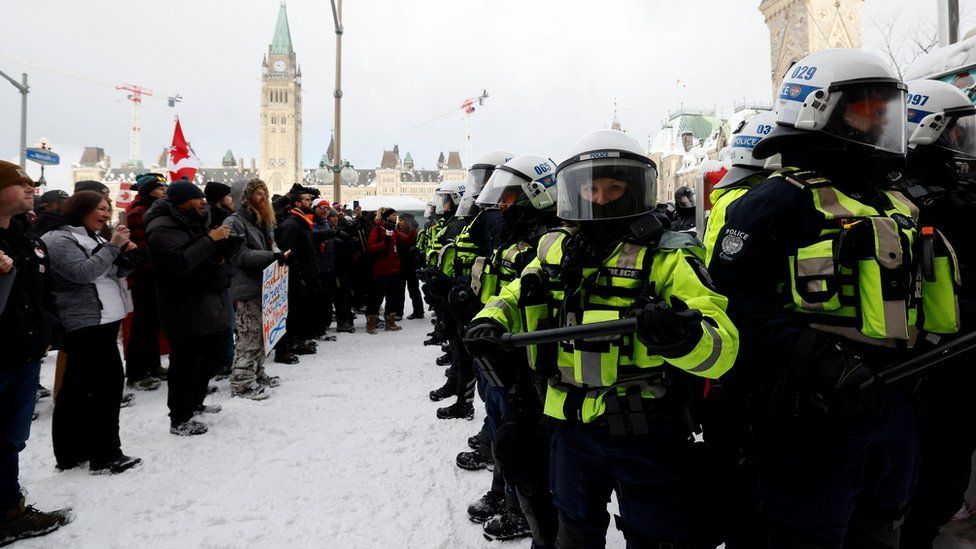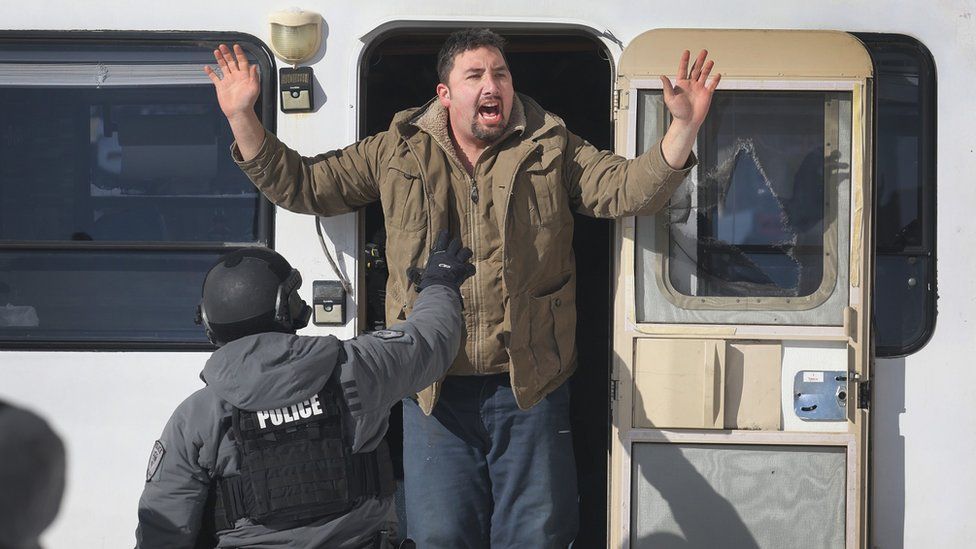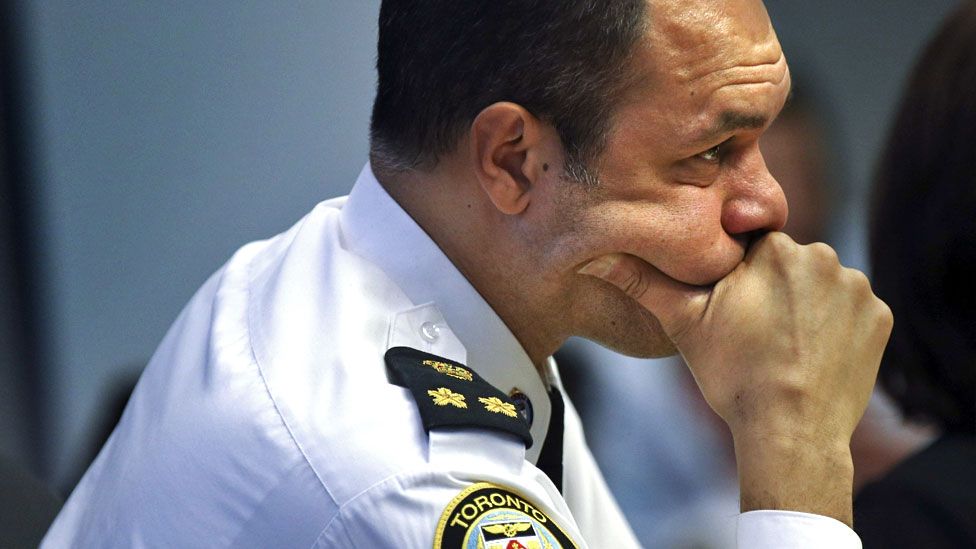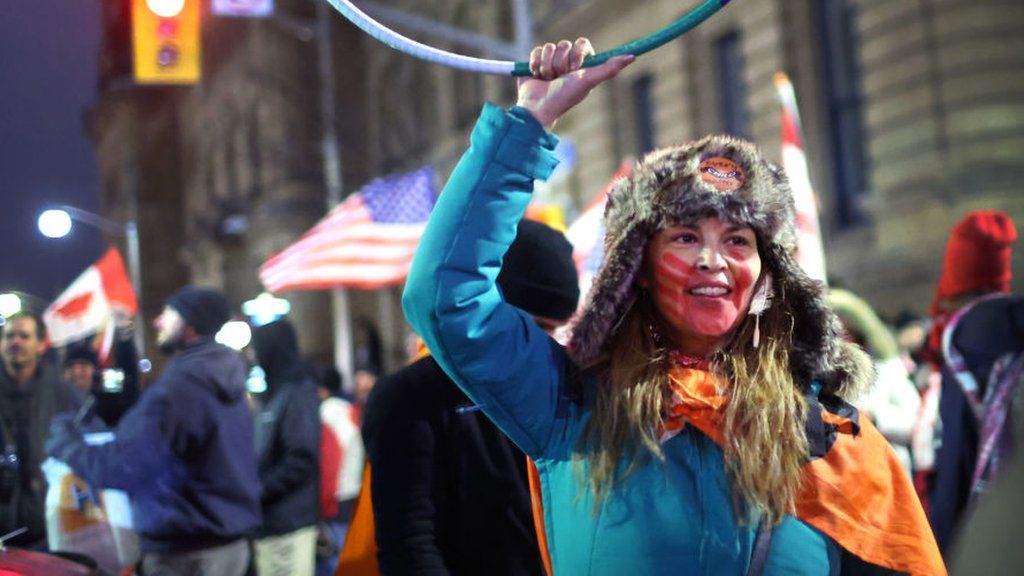Police have said they have 170 arrests over the past two days of operations in Canada’s capital.
This video can not be played
To play this video you need to enable JavaScript in your browser.
Police in Canada’s capital, Ottawa, are moving to closer to the hub of an anti-vaccine mandate protest that has gripped the city for three-weeks.
More than 100 people have been arrested and dozens of vehicles seized as officers, some on horseback, continued the second day of a massive crackdown.
Some protesters who resisted were thrown to the ground and had their hands zip-tied behind their backs.
Police have also accused protesters of launching gas canisters at officers.
Officers advanced into more streets on Saturday, during one of the biggest police operations in Canada’s history. Authorities have now advanced into the heart of the protest zone, next to Parliament Hill.
The crackdown on the self-styled Freedom Convoy began on Friday morning, when hundreds of police, some holding riot batons, descended into the protesters’ encampment in downtown Ottawa.
But some protesters refused to leave, forming a line in front of approaching officers, linking arms and singing the national anthem, O Canada.
“PROTESTORS: We told you to leave,” Ottawa Police tweeted. “We gave you time to leave. We were slow and methodical, yet you were assaultive and aggressive with officers and the horses.
“Based on your behaviour, we are responding by including helmets and batons for our safety.”
Ottawa police set up almost 100 police check-points around the main protest site as well as a large business and residential district in the city centre to prevent more protesters from entering the area. Police towed away 21 vehicles on Friday.
“We will work day and night until this is completed,” Ottawa’s interim police chief Steve Bell said.

Image source, Reuters
On Friday, authorities also reported a “concerted effort” to flood the city’s 911 and non-emergency phone lines. Ottawa police described similar tactics last week, saying a gush of US-based phone calls to local emergency numbers nearly crashed the city’s crisis response system.
Two leaders of the trucker convoy were scheduled to appear in court on Friday. Tamara Lich and Chris Barber were both charged with mischief. Mr Barber also faces an obstruction charge.
What began in late January as a truck convoy headed to Ottawa to oppose a vaccine mandate for truckers crossing the US-Canada border grew into a broader opposition to pandemic restrictions and Mr Trudeau’s government, with supporting protests across the country.
Canada’s House of Commons and Senate cancelled Friday sittings because of police action surrounding the parliament buildings.
Parliamentarians were scheduled to debate the decision by Prime Minister Justin Trudeau to invoke a never-before-used emergencies law.
The law grants government added powers in times of crisis and has been used to impose bans on public assembly in some areas of Ottawa and has prohibited travel to the protest zone, and bringing children to the area among other measures.

Image source, Getty Images
Conservative interim leader Candice Bergen called on Twitter for MPs to return to Parliament on Saturday to stop the “overreach” – referring to Mr Trudeau’s order.
Authorities last weekend cleared the most economically damaging blockade – a bridge linking Windsor, Ontario, with the US state of Michigan. Trucker protests at other border crossings in Coutts, Alberta, and Emerson, Manitoba, ended this week.
Many Ottawa residents have expressed frustration at local police, saying not enough was done to clear the protest, which has paralysed parts of the city around parliament and affected local businesses. The police chief resigned earlier this week over his handling of the demonstration.
On Thursday, an Ontario Superior Court Judge approved a court order freezing millions of dollars – including some held in crypto-currency – raised from around the world to support the protests.
The freeze is part of a class-action lawsuit filed by residents and business owners in Ottawa against protest organisers and participants, as well as against all those who donated funds after 4 February.
Paul Champ, the lawyer for the plaintiffs told the BBC that this order was the “first of its kind” in Canada. The BBC contacted a lawyer representing the protesters for comment.
The government has also begun freezing bank accounts linked to the protests under the temporary emergency measures.
- 3 days ago


